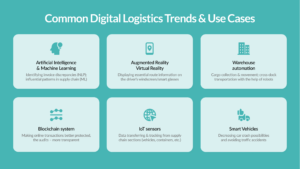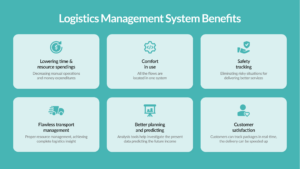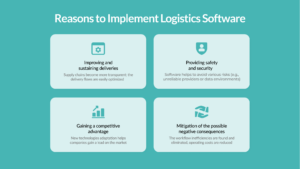The logistics industry is essential to the global economy, providing the backbone for the movement of goods and services around the world. With the advent of digital technology, the logistics industry has undergone a significant transformation, moving from manual processes to digitized ones. Digitalization has helped logistics companies streamline their operations, reduce costs, and enhance customer experience. In this post, we will explore the digitalization of logistics, its benefits, and its challenges.
What is Digitalization of Logistics?
Digitalization refers to the integration of digital technology into all aspects of logistics operations. This includes the use of advanced software, sensors, and analytics to optimize the supply chain, improve operational efficiency, and enhance customer experience. The goal of digitalization is to create a seamless, connected, and data-driven logistics system that can respond quickly to changing market demands.

Improved operational efficiency
Digitalization allows for the automation of many manual processes, reducing the time and cost required to move goods from one place to another.
Real-time tracking and visibility
Implementation of tech products also enables logistics companies to provide real-time tracking information to their customers, giving them visibility into the status of their shipments.
Enhanced customer experience
The use of digital technology allows logistics companies to provide automated notifications, faster delivery times, and other value-added services, enhancing the overall customer experience.
Data-driven decision making
Software solutions provide logistics companies with valuable data insights, enabling them to make data-driven decisions, optimize their supply chain, and reduce costs.
Improved inventory management
Applying digital technologies, businesses can manage their inventory more efficiently, reducing the risk of stockouts and overstocking. Besides, to bring a higher transparency to the existing resources, many organizations opt for warehouse inventory management implementation.
Increased productivity
You can also streamline logistics operations, reducing the need for manual labor and increasing productivity.
Better collaboration
Software products provide logistics companies with an opportunity to collaborate more effectively with their partners, improving communication and coordination across the supply chain.
Reduced environmental impact
We can reduce the environmental impact of logistics operations by optimizing routes, reducing fuel consumption, and minimizing waste.
Improved safety and security
Digitalization enhances the safety and security of logistics operations by providing real-time monitoring, enabling proactive measures to prevent accidents, theft, and other security threats.
Competitive Advantage
This step on the path to success in the logistics niche provides market players with a competitive edge in a rapidly changing market, enabling them to deliver higher levels of service and efficiency than their competitors.

In addition to the benefits discussed above, digitalizing logistics can also help companies to adapt to changing market conditions, such as fluctuations in demand, changes in consumer preferences, and disruptions in supply chain networks. With an LMS in place, companies can quickly adjust their operations to meet changing needs and ensure that goods are delivered to their customers on time and at the right cost.
Steps to Implement LMS
Let’s define the logistics management software implementation flow:
Assess current processes
The first step in implementing an LMS is to assess your current logistics processes. Identify areas that can be improved and determine the goals you want to achieve with the system. This will help you select the right LMS solution that meets your specific needs.
Choose the right LMS solution
Once you have identified your goals, it’s time to choose the right LMS solution. Consider factors such as scalability, functionality, ease of use, and integration with other systems. Research different solutions and consult with experts to make an informed decision.
Define workflows and processes
Before implementing the LMS, it’s essential to define the workflows and processes that will be supported by the system. This includes identifying the roles and responsibilities of different stakeholders and mapping out the steps involved in each process.
Train employees
An LMS is only effective if employees know how to use it properly. Provide comprehensive training to all stakeholders, including shippers, carriers, and warehouse staff, to ensure they understand the system’s features and how to use it effectively.
Monitor and refine
After implementing the LMS, it’s essential to monitor its performance regularly and make adjustments as needed. Use analytics to track key metrics such as delivery times, order accuracy, and customer satisfaction to identify areas for improvement and refine the system accordingly.

Challenges of Digitalization in Logistics
The logistics product development isn’t easy, it may seem complex due to the following list of reasons:
High initial costs
The adoption of digital technology requires a significant upfront investment, which can be a challenge for smaller logistics companies with limited resources.
Complexity
Digitalization has made the logistics system more complex, requiring logistics companies to have a high level of technical expertise and infrastructure to manage the system effectively.
Cybersecurity
The use of digital technology has also increased the risk of cyberattacks, making cybersecurity a critical concern for logistics companies.
Implementing an LMS can be a complex and challenging process, but it’s essential to stay competitive in today’s digital world. At our company, we specialize in providing logistics solutions to businesses of all sizes. Our team of experts can help you assess your current processes, choose the right LMS solution, define workflows and processes, train your employees, and monitor and refine the system for optimal performance.
Conclusion
Digitalizing logistics can provide significant benefits to companies, including increased efficiency, better visibility, improved customer experience, and cost savings. To successfully implement an LMS, businesses must assess their current processes, choose the right solution, define workflows and processes, train employees, and monitor and refine the system regularly. By partnering with a logistics solutions provider, companies can master LMS and stay competitive in today’s fast-paced digital landscape. The benefits of implementing an LMS are clear, and it’s no surprise that more and more businesses are embracing technology to streamline their operations and increase efficiency.
Logistics management software is an essential step for companies looking to stay competitive and succeed in today’s dynamic business environment. By embracing technology and implementing an LMS or any other booming technologies like supply chain business intelligence, many businesses have already streamlined their workflow, improved productivity and performance, as well as provided an enhanced services delivery while having the opportunity to cut down their expenses, which are the ultimate benefits.
creating content that evokes vivid emotions.
